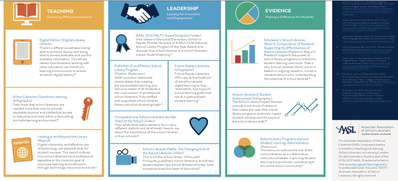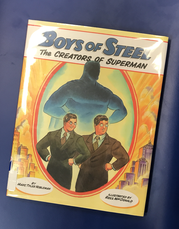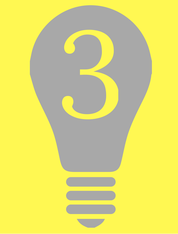I strongly believe that these three big ideas can help all school librarians improve their teaching practice and in doing so, help improve the lives of the learners and teachers who visit their libraries to learn, read, dream, inquire, collaborate and create. I hope that if you missed the conference that this reflection post can help bring you up to speed. If you were able to attend the conference, I'd love to hear about your major take-aways.

Advocacy
Advocacy is a key part of our profession. It's often frustrating to me that we have to keep doing this -- as school librarians, we know in our in our souls how valuable and important libraries are to students and teachers (and we also know that the data shows this over and over and over again). But, in the same way music and arts programs or world language electives must keep demonstrating their impact, school librarians must continually show our worth. And, even if you work in a school in which you are 100% supported by your administrative team, I think that we have a professional responsibility to advocate for school libraries in a larger sense, for our colleagues in other schools and other districts and other states in which school library programs are not valued as central to instruction. Audrey Church (Immediate Past President, AASL) and Priscille Dando (Fairfax County Public Schools Coordinator of Library Information Services) shared resources curated by the AASL Presidential Initiative Taskforce to help school librarians inform adminstrators and other stakeholders of the critical role of librarians as instructional leaders. These tools vary across medium (articles, videos, infographics, reports) and are collected on an infographic and organized into three themes: Teaching, Leadership, and Evidence. Also offered are tips for using the resources as well as an Action Plan Worksheet to help us as we consider the best way to move forward. Every school librarian in the country should be using these tools to emphasize the value of the work we do. I have already started building a page on our library web site highlighting some of these resources and aim to have some conversations with my library partner about our next steps in using these tools from AASL. Corina Haywood and Beth Ebenstein Mulch of T.C. Williams High School in Alexandria, talked about how to show the academic importance of a library program within a school, beyond books; it's important to align library programs and activities with content-specific standards. This idea isn't new, but it's wholly worth repeating. We have to make it clear to teachers that our library instruction is not a fun extra or a place to plan something when they are ahead of schedule; librarians can and do partner to teach the specific standards that teachers need their students to learn. Shannon Hyman's session, "Planning for Future Ready: Building Capacity through Collaboration" was fantasic. Like those in other sessions, she highlighted the value of aligning the work of the school library with admin team goals and the schoolwide plan. She also talked about "collective genius," noting that we are all better when we work together. Librarians should "stop owning everything -- a big part of our job is to empower others." Collaborating with teachers in our schools is one of the key ways to advocate for our library programs. One thing that really struck me while listening to Shannon is that that in our profession (and in education as a whole) we need to be better at sharing our work with each other so that we can reuse, remix, mashup for our own libraries and classrooms. 
The Importance of Questioning
In our first conference keynote, author Marc Tyler Nobleman spoke. Writer of several non-fiction works such as Boys of Steel: The Creators of Superman and Bill the Boy Wonder: The Secret Co-Creator of Batman, Marc discussed his process of finding the story: asking lots of questions, acting like a detective, digging deeper into the subject to find out things no one else knows to write meaningful stories. He noted that "history is EVERYWHERE" and that we need to encourage our students to do the same kind of detective work -- questioning what they read and hear, working to find out more. In a session called "A Few of our Favorite Things," librarians Lara Ivey and Melissa Urban briefly discussed the MISO Method of Action Research from Cathryn Berger Kaye, which inspires students to really delve into a topic, asking questions, acting with curiousity formulating research problems, and learning deeper. The method as outlined on Kaye's web site includes:
Kate Newton and Sarah Fite, librarians from Episcopal High School in Alexandria, offered a session "The Lie of the Year: Fake News and Digital Media Literacy" highlighting the importance for each and every one of us to carefully question and evaluate the information we encounter online. Information comes at us from all of our social feeds, forwarded from friends and family, from reliable and unreliable web sites and news sources. As librarians and teachers of information literacy, training our students is crucial in this age of disinformation, and I also see a real opportunity for my library partner and I to offer some PD to teachers and staff on this topic. We ALL need to question -- not just our kids.
Reading Still Matters
It does. And now, more than ever, we need to ensure students have choice over what they read, that all of our learners are represented in the titles in our collections, and that students can access the text they are reading. Put hearing Donalyn Miller speak on your bucket list. Her keynote made me cry, made me laugh, made me cheer, made me so happy to be someone who gets books into the hands of readers. She spoke about how crucial is is to give kids access to books and choice in their reading selection. Donalyn raised the evidence that "self-selected reading is twice as powerful as teacher-selected reading in developing motivation & comprehension" (Bridges, Scholastic, 2014) and asserted that as with anything, we must give students a lot of practice choosing books so that they become good at it. I also loved Donalyn's emphasis on steering clear of judgment -- it's key that we don't undermine a student's reading choices (sarcastic tone: "Manga, again?) sharing the poingnant words, "when we diminsh a child's reading choices, we diminish the child who made that choice." Shannon Outlaw's session was called "Black Stories Matter." She encouraged us to really think about our current collections and the titles we buy in the future.:
Ian More of AIM-VA spoke about using technolgy to help struggling readers. He raised the contrast between learning-to-read and reading-to-learn, noting that if the primary skill we need students to do isn't literally reading the text, we should be offering tools and accomodations to make the content more accessible to students. Accomodations might include varied print (ie: font size, font color, or font type), navigation (ie: chapter headings/subheadings, page numbers, search tool), annotations (ie: text and drawing tools, built-in dictionaries, note-taking features), and audio (ie: text-to-speech, synchronized highlights, human narrated). I loved Ian's comment, "don't let people tell you audio is cheating. From a cognitive standpoint, audio is the same as 'reading' text." It is so crucial for our students to be able to consume the text we want them to read AND those selections they choose to read -- we must give them the tools for access.
* * *
Advocacy, Questioning and Reading Still Matters. These big ideas will continue to resonate with me throughout the school year. What were the big ideas you collected from the VAASL conference? I would love to see your comments below or link to your reflection post! And stay tuned for next week's post -- I'll share the easy (but big impact) ideas and lots of great tools highlighted at the sessions that I attended.
-Gretchen You might also like:
0 Comments
Your comment will be posted after it is approved.
Leave a Reply. |
Who We Are
Join our list!Archives
September 2020
Categories
All
|







 RSS Feed
RSS Feed